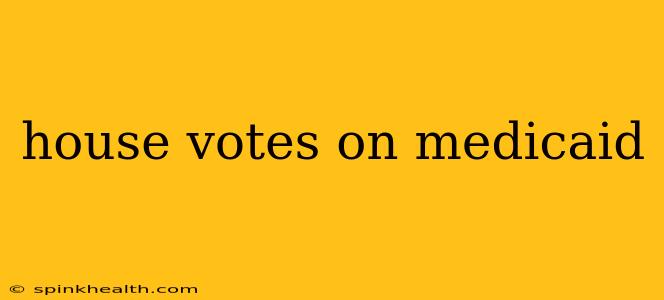The ongoing debate surrounding Medicaid funding and eligibility in the United States is a complex tapestry woven with threads of political ideology, economic concerns, and the very real needs of millions of Americans. Recent house votes on Medicaid reflect this complexity, often resulting in intense scrutiny and passionate public discourse. Let's delve into the intricacies of these votes and explore the key questions surrounding this vital healthcare program.
What are the Current House Proposals Regarding Medicaid?
This question is tricky because proposals change frequently depending on the political climate and the specific legislative session. However, the general themes often revolve around:
-
Expansion of Medicaid: Proposals to expand Medicaid eligibility to more low-income adults, often focusing on closing the coverage gap in states that haven't yet expanded under the Affordable Care Act (ACA). This usually involves debates about federal matching funds and state budgetary implications.
-
Work Requirements for Medicaid Recipients: A recurring point of contention involves the imposition of work requirements or community engagement activities as conditions for Medicaid eligibility. Proponents argue this promotes self-sufficiency, while opponents cite potential barriers to access for vulnerable populations.
-
Funding Levels and Budgetary Allocations: Ongoing debates center around the appropriate level of federal funding for Medicaid. This impacts states' ability to provide adequate healthcare services to their residents and often leads to difficult choices about program benefits and eligibility criteria.
-
Changes to Eligibility Criteria: Proposals frequently emerge to modify Medicaid eligibility criteria, sometimes tightening restrictions to limit the number of recipients or adjusting income thresholds.
How Do These Votes Affect States and Individuals?
The ramifications of House votes on Medicaid are far-reaching and profoundly impact both states and the individuals who rely on the program for healthcare. State budgets are significantly influenced by the level of federal Medicaid funding they receive. Changes to eligibility criteria can lead to people losing coverage, potentially resulting in delayed or forgone medical care, increased healthcare costs, and even worse health outcomes.
For individuals, the consequences can be devastating. Loss of Medicaid coverage can mean going without necessary medical treatment, facing mounting medical debt, or experiencing significant financial hardship. The uncertainty created by these ongoing votes adds extra stress and anxiety to already vulnerable populations.
What are the Arguments For and Against Medicaid Expansion?
The arguments surrounding Medicaid expansion often clash along ideological lines. Supporters highlight the program's role in improving public health outcomes, reducing healthcare disparities, and supporting the economy by boosting employment in the healthcare sector. They argue that expansion saves lives and reduces overall healthcare costs by providing preventative care.
Conversely, opponents raise concerns about the fiscal sustainability of Medicaid expansion, suggesting it increases the national debt and places an undue burden on taxpayers. Some also argue that it disincentivizes work and personal responsibility.
What is the Current Status of Medicaid Funding?
The current status of Medicaid funding is perpetually fluid, influenced by ever-changing federal budgets and political priorities. To get the most up-to-date information, it's crucial to consult reputable sources like the Kaiser Family Foundation and the Centers for Medicare & Medicaid Services (CMS). These organizations offer detailed analyses and data on Medicaid funding, enrollment, and policy changes.
What Happens After a House Vote on Medicaid?
After a House vote, the bill proceeds to the Senate for consideration. If the Senate approves the bill, it goes to the President for signature. However, even if a bill passes both chambers of Congress, it may still face legal challenges or implementation hurdles. The legislative process surrounding Medicaid is notoriously complex, with numerous opportunities for amendments, delays, and compromises.
The ongoing debate over Medicaid underscores its critical role in the American healthcare system. It's a reflection of fundamental disagreements about the role of government in healthcare, economic priorities, and social justice. Understanding the complexities involved requires careful consideration of both the perspectives of proponents and opponents, as well as the lived experiences of those who depend on the program. Staying informed about legislative updates and engaging in thoughtful public discourse is crucial to ensuring that the voices of all stakeholders are heard in this important national conversation.

